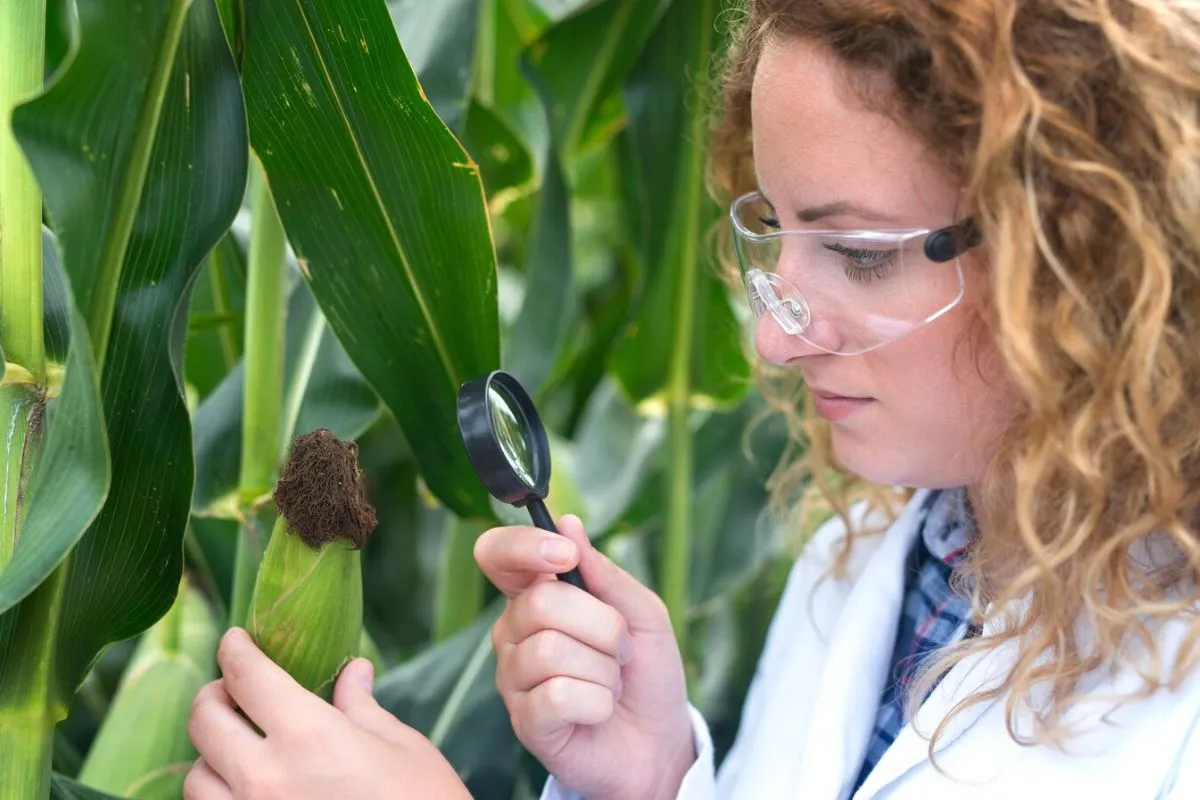Creating Disease-Resistant Edible Crops with Genetic Engineering is transforming agriculture. These crops are engineered to resist pests and diseases, reducing the need for chemical pesticides. This leads to safer, more sustainable farming practices.
Genetic engineering provides modern techniques to enhance crop resilience. By introducing specific genes, scientists can fortify plants against various environmental stresses. This not only increases yield but also improves crop quality.
These innovations ensure food security and increase agricultural efficiency. They help farmers produce more food with fewer resources, addressing global hunger challenges. Additionally, healthier crops contribute to a more stable food supply chain.
The Basics of Genetic Engineering in Agriculture
Genetic engineering involves manipulating an organism’s DNA. Scientists can insert, delete, or modify specific genes. This precise modification ensures desired traits are achieved without unwanted changes.
It allows for precise modifications. For instance, genes from naturally resistant plants can be incorporated into vulnerable crops. This enhances their ability to withstand diseases.
This technology is pivotal in creating disease-resistant edible crops. It significantly reduces crop losses due to pests and diseases. Consequently, it promotes higher yields and better food security globally.
What Are Disease-Resistant Crops?
Disease-resistant crops have enhanced immunity. They can withstand pathogens and pests. Genetic engineering plays an integral role here.
Traditional breeding methods were time-consuming. They also had lower success rates. However, genetic engineering accelerates the process.
Techniques in Genetic Engineering
CRISPR-Cas9 is a revolutionary tool. It allows for precise genome editing. This accuracy helps in creating disease-resistant varieties.
Another technique is gene silencing. This method inhibits disease-related genes. Consequently, the plant remains unaffected by diseases.
Transgenesis, where genes from different species are introduced, is also notable. This expands the genetic diversity and resistance in crops.
Benefits of Creating Disease-Resistant Edible Crops with Genetic Engineering
Genetically modified crops bring numerous advantages. These benefits resonate across various sectors.
Increased Crop Yields
Disease-resistant crops lead to higher yields. Farmers face fewer losses. This stability improves food supply.
Farmers in developing countries benefit the most. Their reliance on stable crops enhances their livelihood. It also boosts local economies.
Reduced Chemical Usage
Diseases often require chemical treatments. These treatments can be harmful. Genetically engineered crops reduce this dependency.
Lower chemical usage benefits the environment. It also safeguards human health. Thus, creating a more sustainable agriculture system.
Economic Advantages
Genetically engineered crops can cut costs. Reduced need for pesticides and herbicides saves money. Increased yields also mean higher profits.
These economic benefits extend to consumers. Stable food prices and better quality are direct outcomes. Reduced crop losses ensure food availability.
Methods of Creating Disease-Resistant Edible Crops
Multiple methodologies contribute to this innovation. Each method has unique strengths.
Gene Editing Tools
CRISPR-Cas9 is a standout tool. Its precision is unmatched. This method can target specific genes related to disease susceptibility.
Another method is TALENs (Transcription Activator-Like Effector Nucleases). Like CRISPR, it offers precision. It can also be used to deactivate certain genes.
Marker-Assisted Selection
This traditional method is enhanced by modern technology. Genetic markers identify desirable traits. Subsequent generations are screened effectively.
This method complements genetic engineering. It ensures the stability of disease-resistant traits. Thus, creating robust crop varieties.
RNA Interference (RNAi)
RNAi is employed to silence specific genes. These genes are often involved in disease pathways. The result is a resilient crop variety.
This method is non-invasive. It retains the crop’s genetic integrity. Thus, minimizing ethical concerns related to GMOs.
Challenges in Genetic Engineering for Disease-Resistance
Despite advancements, challenges remain. Ethical, regulatory, and technical issues persist.
Regulatory Hurdles
GMO regulations are stringent. Approval processes can be lengthy. This delays the deployment of disease-resistant crops.
Different countries have varied regulations. This inconsistency hinders global adoption. Harmonizing standards is crucial.
Ethical Concerns
Public perception of GMOs is mixed. Concerns about safety and ethics persist. Transparent communication is needed.
Stakeholders must emphasize scientific evidence. This helps in gaining public trust. Ethical practices ensure broader acceptance.
Technical Limitations
Gene editing requires precision. Off-target effects can occur. These unintended changes must be minimized.
Advancements in technology are addressing these issues. Continuous research is key to refining methods. Ensuring safety remains a priority.
Case Studies of Successful Disease-Resistant Crops
Certain crops showcase the success of genetic engineering. These examples highlight tangible benefits.
Bt Cotton
Bacillus thuringiensis (Bt) cotton is noteworthy. It resists bollworm, a major pest. Farmers report higher yields and reduced pesticide use.
This success encourages adoption of similar crops. It demonstrates the practical benefits of genetic engineering. Innovations like these boost confidence in GMOs.
Golden Rice
Golden Rice is engineered to combat nutrient deficiencies. It contains beta-carotene, a precursor to Vitamin A. This addresses malnutrition issues in developing countries.
Beyond disease resistance, it highlights another benefit. Genetic engineering can enhance nutritional content. Thus, improving public health significantly.
Papaya Ringspot Virus-Resistant Papaya
The papaya industry faced devastation due to the ringspot virus. Genetic engineering introduced virus-resistant varieties. This revitalized the industry.
Similar approaches can save other crops. Disease-resistant papayas set a precedent. It showcases the power of genetic engineering.
The Future of Disease-Resistant Edible Crops
The future holds promise with continuous advancements. Emerging technologies will overcome current limitations.
Artificial Intelligence (AI) in Genetic Engineering
AI can optimize genetic modifications. It enhances precision in gene editing. This reduces off-target effects and increases efficiency.
Integration of AI accelerates research. Faster iterations lead to quicker results. Combining AI with genetic engineering is transformative.
Next-Generation Sequencing
Sequencing technologies are evolving. They provide deeper insights into crop genomes. This helps in identifying resistance genes efficiently.
Combining sequencing with editing tools is powerful. It enables the creation of highly robust crops. Monitoring genetic changes is simplified.
Global Collaborations
Collaborations across borders enhance research. Shared knowledge speeds up innovations. It also helps harmonize regulations globally.
Public-private partnerships are essential. They bridge gaps between research and application. Global efforts ensure widespread benefits.
Summarizing the Benefits and Future Pathways
Creating Disease-Resistant Edible Crops with Genetic Engineering is a game-changer. It ensures food security and sustainability. The benefits outweigh the challenges.
Innovations like CRISPR and AI drive progress. Ethical practices and collaborations are crucial. The future of agriculture is promising.
Explore opportunities in this field. Engage with ongoing research and developments. Join the movement towards a sustainable future.
Frequently Asked Questions
What is genetic engineering?
Genetic engineering manipulates DNA to alter traits. It includes technologies like CRISPR and gene silencing.
Are genetically engineered crops safe?
Extensive studies affirm their safety. Regulatory bodies ensure rigorous testing before approval.
How do disease-resistant crops benefit farmers?
They reduce losses and chemical costs. Increased yields lead to higher profits and food security.
What are the ethical concerns with GMOs?
Concerns include safety and environmental impact. Transparent practices and education can address these issues.
Will genetic engineering eliminate agricultural diseases?
It significantly reduces disease impact. Continuous advancements are needed for comprehensive solutions.



